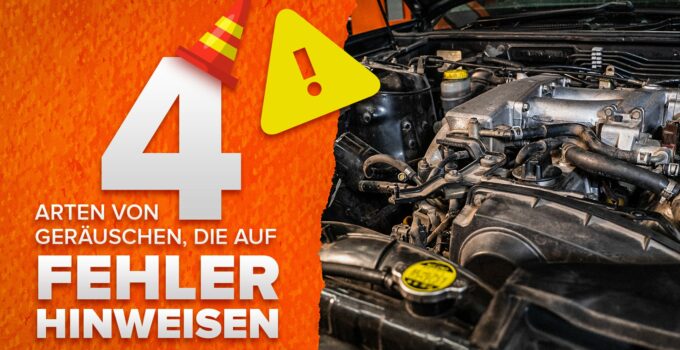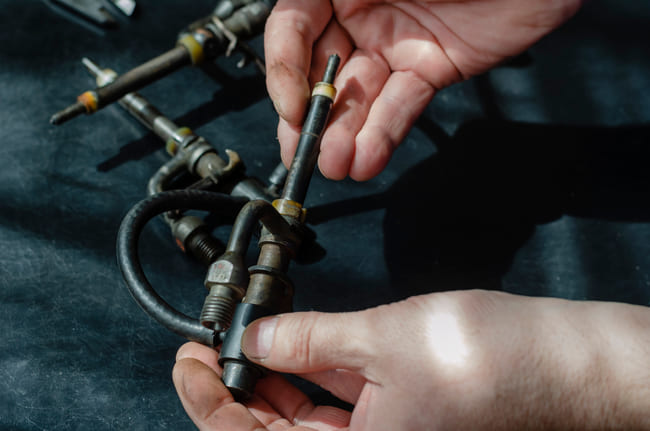
There are a number of different engine sounds. For example, you may hear a clicking sound in the engine compartment. Even if your car makes loud noises when driving, it rarely means anything good. You should always listen carefully when the noises that you normally hear when driving and idling change significantly. The rattling of the engine when starting can indicate problems with the starter. If you ignore such clear early warning signs of defects, not only can your car let you down; no, even much more serious consequential damage can occur. It is often noticed very quickly when your car makes noises when it is stationary, because then attention is drawn to it more.
Contents
How can unusual noises be classified systematically?
First of all, it is important to know whether, for example, your engine only makes a clicking noise when idling or whether it clicks when you open the throttle. A knocking of the engine when it is cold has different causes than a knocking while driving. Information can be derived from these queries and it can be clarified step by step how to identify the cause.
If you now know whether your engine makes the noise only or mainly when idling or when stationary, then some vehicle components and systems can be ruled out. This applies in particular to the entire chassis, the brakes, but also the drive train after the clutch, i.e. constant velocity joints, gears, etc. This is because these do not move at all when the vehicle is stationary or idling and are also not loaded. Of course, this is different with regard to the clutch itself, all components of the engine, your cooling system, your fuel supply and your engine lubrication system. This is because these vehicle components are already active when idling. A particularly characteristic noise is a knocking of the engine. This is a particular problem for internal combustion engines that run on gasoline.
Compression-ignition engines, i.e. diesel vehicles, do not have this problem. The cause is generally fuel combustion which is not/cannot be controlled precisely. This leads to additional ignitions, which also suddenly changes the pressure in the corresponding piston and the temperature. Ultimately, this not only leads to unpleasant noises, but also to serious damage in the area of engine valves, bearings, your cylinder head or even the spark plugs. For this reason alone, you should visit a workshop as soon as possible if you notice such behavior.
Nageln_beim_Dieselmotor”>Nageln in diesel engines

Even if engine knocking cannot occur in a diesel vehicle because there is no spark ignition, the timing of self-ignition can still be inappropriate. As a rule, this is a delayed inflammation that can be caused by various factors. Among other things, insufficient fuel atomization can occur when injecting through faulty nozzles. In this case, larger droplets form, which makes self-ignition more difficult. In addition, there are some external circumstances or engine peculiarities that can delay ignition. This includes, for example, a cold start (glow plugs defective) or the use of fuels that have a low so-called cetane number. Ultimately, there can also be considerable consequential damage when nailing, so you should pay attention to such noise development and get to the bottom of it. An easy remedy can be to have the injectors cleaned.
Why does your car make a loud noise while driving?
To find out, you should first find a good road surface to drive over. If your car drives there quietly and the noise only occurs when driving over bumps or bumps, the wheel suspension is often to blame. If the noise persists despite the level road surface, a problem in the drive area is more likely. In order to narrow down the area from which the noise is coming (it cannot always be located without a doubt with your ear inside the vehicle), you should follow a few steps. First drive straight ahead at a constant speed so that you can hear the sounds clearly. Then uncouple. If the noise disappears now, you should check the gearbox, differential and clutch more closely. If the noise from disengaged persists, the gearbox and clutch can be ruled out.
Now accelerate back to the original speed and then switch off your engine to continue driving with the clutch depressed. Please note that switching off the vehicle engine will also stop the power steering from working. It is therefore best to choose a long, straight route. If the noise is still there after the engine has been switched off, it is very likely that your vehicle's chassis is responsible. For example, worn wheel bearings, broken springs or broken control arm bushings can be the cause.
Finally, stop your car and let the engine idle. Let it howl a few times while stationary by accelerating. If noises occur even though the vehicle is stationary, you can assume that the water pump, alternator, associated belts, timing chain or the engine itself are contributing to the noise development. In such a case, have a suitable workshop carry out a comprehensive diagnosis. Problems with your vehicle engine can easily be avoided if you observe the appropriate maintenance intervals and have the engine flushed from time to time.
Conclusion
It is worth paying attention to unusual noises both when the engine is started and when it is idling, as well as when driving. Because changes in the background noise usually indicate defects or are signs that they are imminent. And because it's better to be safe than sorry, it's usually worth repairing minor defects quickly, or having them repaired, so that no consequential damage occurs. So in the future, listen to your vehicle a little more closely, because you'll be able to recognize a clicking or knocking of the engine in no time at all.
A tip from CarTipsandmore: Just because your car is unusual makes noises does not necessarily mean that there is a serious defect. They are often caused by things lying around in the car. A parking disc lying loose in the side compartment of your car door can quickly lead to worrying noises. For this reason, we advise you to clean and clear out your car regularly. You also save fuel, because every unnecessary kilo increases your fuel consumption.
